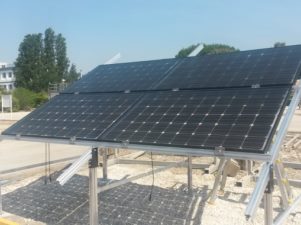The PV project and the observatory are located on a mountain near La Higuera, a town in the Coquimbo region that is on the outskirts of the Atacama Desert, 600 km north of the capital city Santiago.
“We are very pleased to have begun work on a second highly innovative project in Chile, following the inauguration of the very successful Ollague hybrid facility,” said EGP CEO Francesco Venturini. “With La Silla, our continuous innovation in renewable energy technology will provide another example of excellence in clean energy generation, underscoring how sustainability and innovation must go hand in hand. We are looking forward to starting power supply to the observatory and we are excited about the range of opportunities that will emerge from these new ways of producing energy.”
EGP will invest approximately 3.4 million US dollars in the construction of the PV plant, which is expected to be completed in the first half of this year.
The La Silla PV plant will utilise state of the art panels, including innovative smart and bifacial modules. The smart module boasts a microchip that optimises production from each panel by allowing it to deliver electricity to the grid regardless of any eventual malfunctions affecting other panels, unlike conventional modules where one malfunctioning panel can affect production of the other working panels. The bifacial module captures solar energy from both sides of the PV panel as opposed to traditional modules, which capture energy from just one side of the panel.
La Silla will be the first utility-scale PV plant in the world to combine the use of smart and bifacial modules with conventional modules for side-by-side testing, during which the performances of the innovative technologies will be compared to those of the conventional panels in the same site. The use of innovative panels is expected to increase power generation at the facility by between 5% and 10% compared to a conventional PV plant of equal size.
The new facility, which has a long-term power purchase agreement with the La Silla astronomical observatory, will deliver its energy to Chile’s Central Region Interconnected System (SIC). Once fully operational, the PV plant will be able to generate approximately 4.75 GWh each year, equivalent to the electricity needs of approximately 2,000 households and more than 50% of the observatory’s annual power consumption. The clean energy generated by the PV plant will avoid the emission of over 2,000 tonnes of CO2.
The La Silla observatory is equipped with several optical telescopes with mirror diameters of up to 3.6 metres. The facility belongs to the European Southern Observatory (ESO1), the pre-eminent intergovernmental astronomical research organisation. ESO is carrying out an ambitious programme focused on the design, construction and operation of powerful ground-based astronomical observation facilities, and has the aim of enabling important scientific discoveries. As well as La Silla, ESO owns the Paranal and Chajnantor observatories, also located in the Atacama Desert.
EGP currently operates a portfolio of plants in Chile that have a combined installed capacity of more than 600 MW, of which 340 MW comes from wind power, 174 MW from PV solar and 92 MW from hydropower. In addition, Enel Green Power currently has close to 600 MW of projects in execution which, when completed, will bring the company’s total installed capacity in Chile to about 1,200 MW. Among these projects, EGP is building in partnership with ENAP Cerro Pabellòn, South America’s first geothermal plant that will have a gross installed capacity of 48 MW.
Enel Green Power is the Enel Group company fully dedicated to the international development and management of renewable energy sources, with operations in Europe, the Americas, Africa and Asia. With a generation capacity that corresponds to approximately 34 billion kWh in 2015 from water, sun, wind and the Earth’s heat – enough to meet the energy needs of more than 15 million households – Enel Green Power is a world leader in the sector thanks to its well-balanced generation mix that provides generation volumes well over the sector average. The company has an installed capacity of close to 10,500 MW from a mix of sources including wind, solar, hydropower, geothermal and biomass, and has more than 710 plants operating in 16 countries.
01 Марта 2026 | воскресенье | 14:36


